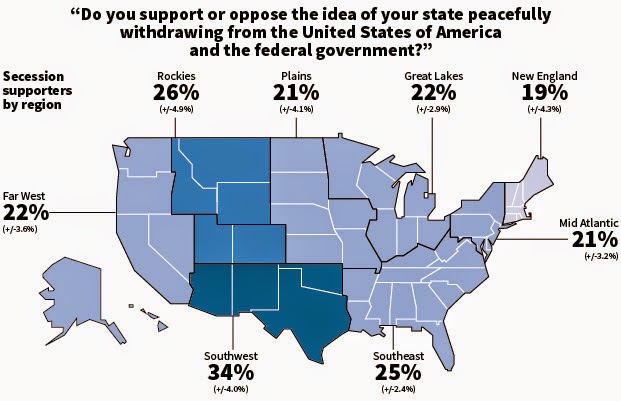Secession Cometh to America?
ZeroHedge.com
There is much talk about the fragmentation of the international order. The failure of the Doha Round at the WTO, the efforts to make national firewalls are digital information, the decline cross-border movement of capital since 2008, the decline trade, the rise of anti-immigration sentiment all are part of the pessimistic picture painted by some observers.
The Scottish referendum also underscored how vulnerable the nation-state itself is to the centrifugal forces that have been unleashed. Parts of Spain want to leave. Parts of Italy and Germany have made secessionist noises. Sometimes it appears if it weren’t for Brussels, Belgium might have ceased to be a country.
It turns out the US also may be subject to secessionist sentiment. This Great Graphic is the result of a survey Reuters conducted and Jim Gaines wrote about here. It was an internet-based survey that included about 9000 people. It asked a straightforward question: “Do you support or oppose the idea of your state peacefully withdrawing from the United States of America and the federal government?”

The results Gaines showed are on a regional basis. If you click here, you will be able to filter the data by state and numerous demographic categories. Gaines reports that Republicans favor their state leaving more than Democrats, the right more than the left-leaning independents, younger rather than older, lower income more than higher income and high school educated more than college educated.
In aggregate the results showed about a quarter (23.9%) of the respondents answered in the affirmative. This is greater than the support for most of the anti-EU parties in Europe, like the UKIP and AfD. Does this mean that next year, the 150th anniversary of the end of the war for Southern independence (Civil War), investors should be concerned about a new secessionist movement?
Gaines reports that follow-up conversations with some of the respondents found that the secessionist vote was more a protest vote than a genuine desire to secede. The sense of aggrievement, Gaines found, was comprehensive, bipartisan, and deeply felt, even if somewhat incoherent. It is an expression of disapproval of the direction that the country has moved, or is moving in, rather than a call for independence.
Some surveys in Europe has found, in a similar vein, that many voters of the anti-EU parties were also expressing disapproval and frustration. In Germany, most recently the AfD won representation in two German state governments on a conservative social agenda, not its anti-EU stance, which it played down, for example.
The political elites in the US and Europe have their work cut out for them. There may be an economic solution for part of the problem, but it is not just about the pace of growth and historically high level of unemployment in many countries. The issue of disparity of income and wealth means that aggregate measures of economic activity are no longer sufficient proof that more citizens have access to a better life. In many high income countries, the crisis is over the social contract, which has fallen into disrepair, and respected primarily in its breach.
